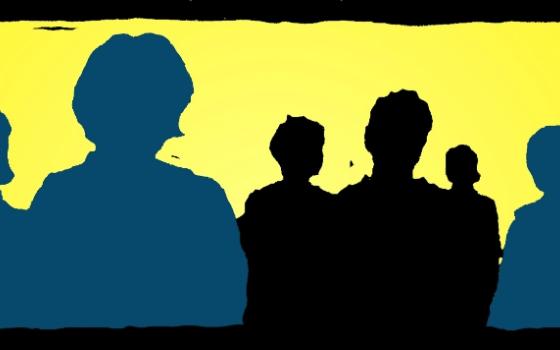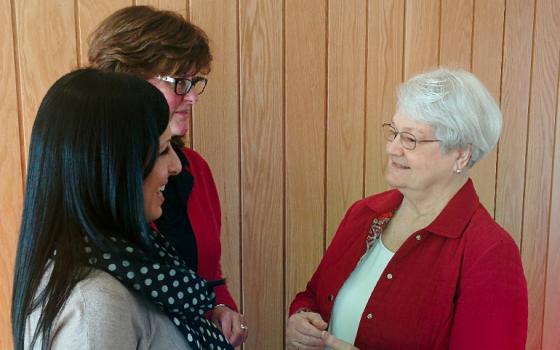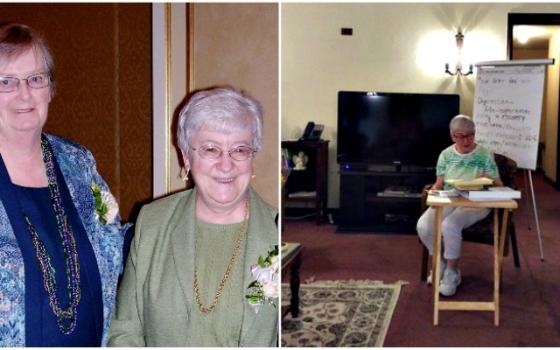When Immaculate Heart of Mary Sr. Mary Ellen Merrick was struggling with alcohol addiction in the late 1970s, there weren't a lot of options for Catholic women religious.
"There was nothing for sisters," Merrick said.
The then-28-year-old middle school teacher spent three months at Alina Lodge, a treatment center in Blairstown, New Jersey.
"People didn't expect me to have issues with God or issues as a woman," said Merrick, now executive director of the women's program at Guest House, a residential treatment facility in Lake Orion, Michigan, for priests and religious.
She was hesitant to share her innermost thoughts with the laywomen in the program at Alina Lodge.
"It did help me, but there were areas like my spirituality and my sexuality that I didn't feel comfortable mentioning because no one expected me to need to discuss these areas," Merrick said.
Public accounts of mental health disorders and addictions among women religious have been rare, as have details of treatment and recovery. That may in part be because of the pervasive shame those illnesses can elicit, as well as a historical tendency for those who struggle with them to be directed only to spend more time in solitary prayer.
That is changing as knowledge and attitudes about mental illness evolve. Though difficult to establish a direct cause-and-effect relationship, it's become clearer over time that addiction and mental health disorders are pegged to a combination of factors, including chemical imbalances and possibly brain abnormalities. Some individuals have also experienced grief and depression as they watch their communities cope with declining numbers and aging membership.
There's "still such a strong stigma in mental health," said Franciscan Sr. Dorothy Heiderscheit, CEO at Southdown, a treatment center in Holland Landing, Ontario, that now is open to men and women in Christian ministry. "It's in part the belief system that 'If I'm helping people, I can't be weak.' It's embarrassment and probably shame."
For a time, she said, "most of our facilities, us included, kept a low profile to protect the people we have. [But] more and more of us are saying that doesn't counteract the stigma."
Overlooked and underserved
This newer sensibility has led to a quiet revolution in mental health care tailored to the needs of women.
"When we started our program, it was clear that women religious tend to be underserved by the medical community," said Msgr. Stephen Rossetti, a priest and psychologist who headed the St. Luke Institute in Silver Spring, Maryland, and now teaches at the Catholic University of America in Washington, D.C. "Women were trained not to take care of their own needs, not to complain and to look after everyone else ... especially women religious."
Changes in how the church now approaches mental health issues among its own can be traced back about 70 years (though well before the clergy sex abuse crisis became public knowledge), when Catholic religious congregations became more rigorous in the way they approached vocational discernment.
In 1947, recovering alcoholic Austin Ripley attempted to set up a rehabilitation center for priests, says Jeremiah Gardner, manager of public affairs and advocacy at the Hazelden Betty Ford Institute for Recovery Advocacy.
"Others supported Ripley's pursuit but eventually favored a center that would serve 'all professionals,' " Gardner said. "Ripley's insistence on a priests-only facility removed him from the venture, but he continued to pursue his mission to open a Guest House for alcoholic priests."
The Guest House program for clergy and men religious was launched in the 1950s, and a program for women on the Lake Orion campus opened in the 1990s. (Hazelden, founded in 1949 and with 17 locations in the country, was an early resource for women religious and other people of faith.)
Sister Frances (not her real name), then a schoolteacher, arrived at Guest House more than a decade ago because her provincial leader told her she needed to get help. Frances is now part of a different community.
During her nine months at Guest House, Frances said, she was diagnosed with bipolar disorder. Previously treated for depression and part of a 12-step program, Frances said that when she arrived, she was "not very far from drinking again because of the difficulties I was having, whether they were my moods or my relationships. That confused me: Why was I being sent to a treatment center?"
Part of the reason Frances spent such a long time at Guest House was the challenge of weaning her off the medications she'd been prescribed and finding a new treatment baseline, said Merrick, head of the women's program there who has stayed in touch with Frances.
At the end of her treatment, Frances had discovered, as she grew to trust the staff and her companions, that "I was lovable. I'm able to love and be loved because I'm Frances."
Mental health screening for candidates considering religious life wasn't generally practiced before the 1960s, says Georgetown University medical ethicist and research scholar Daniel Sulmasy, who spent more than 25 years as a Franciscan friar. "People who were very quiet and talked about seeing angels were considered mystics and moved along in the system. Only after taking vows were they considered mentally ill and sent to places like state mental hospitals."
Vatican II: questioning convention
The reforms that came in the wake of the Second Vatican Council in the early 1960s were a watershed moment for Catholic sisters. They modified their dress, pursued professional degrees, went out to eat, and applied for their own credit cards. But for those who might have a mental disorder or a suppressed addiction problem, the new freedoms brought potential danger as well as opportunity.
It was a time when many who had embraced religious vocations in a top-down, highly controlled structure actually became adults, says Southdown's Heiderscheit. Some left religious life to get married or because they determined it wasn't for them.
Many stayed, but some struggled with the transition, she said: "People who had entered religious life at a very young age in communities with a controlling, authoritative style didn't trust their judgment as adults."
While this story focuses on women, men religious and clergy grapple with the same issues.
"When you look at the pathology rate around the world, including the United States, we see that women and men are similar, but they also have psychological and spiritual differences," Rossetti said.
Cardinal Joseph Tobin of Newark, New Jersey, a 1988 graduate of the Guest House program, is candid about his sobriety — but he doesn't parade it. That's because of his belief, he said, that the journey away from addiction "isn't my recovery, and isn't my achievement. It's a gift from God. I'm gratefully testifying to what I've been given. But I also think that AA and other 12-step programs have a very healthy suspicion of [self-] promotion."
Though the cardinal, a member of the Redemptorist order, said in a recent interview that he doesn't generally start a conversation by sharing his story, he isn't reticent about recounting it if asked. Tobin, who jokes that one description of Alcoholics Anonymous is that "alcoholism is a Catholic disease treated in the basements of Protestant churches," added that in his time at Guest House, "I came in a pretty sick puppy and came out with hope and the tools that helped me move forward."
Rates of depression are higher for women, who are more likely to be diagnosed with borderline personality disorder, Rossetti said, while men have higher rates of sociopathy and malignant narcissism.
Treatment protocols for women also differ, he said. When the women's program at St. Luke began three decades ago, Rossetti turned to the women in management, both members of religious orders and laypeople, for help. "It was very different, with a greater emphasis on group work and treating pathologies more prevalent in women as well as time for communal prayer and Scripture."
While women were very supportive of each other, sometimes they needed to be able to challenge one another and learn to use their anger in a positive way, he said. The St. Luke program integrates single- and mixed-gender sessions, Rossetti said.
A network for addicted sisters
Sr. Mary Gene Kinney, a Sister of Charity of the Blessed Virgin Mary, co-directs the Inter-Congregational Addictions Program, which helps congregations in 31 states and the province of Ontario intervene, find treatment resources and support aftercare for chemically dependent sisters.
A piano teacher and, later, a music therapist, Kinney, who would use the money she made to buy booze for herself, recalled that parishioners at the time were "delighted to give you a bottle" of liquor as a gift.
In the early 1970s, when Kinney was seeking help for her addiction to alcohol, "it was treated in the mental health field and not as the brain disease it is," she said.
Though she saw mental health professionals, she didn't make progress. Instead, she became hooked on medication. While a stint at Hazelden was helpful, she said, "I couldn't sustain it. I was too intellectual for AA. I couldn't picture myself in it. I didn't want anyone to know I had this awful disease."
Kinney applauds the creation of specialized programs for women, saying they do better in community-based settings. When she and program co-founder Sr. Letitia Close began their work in the 1970s, the main addictions for sisters were alcohol and prescription drugs. Eventually, their network expanded to include eating disorders.
Now, sisters in the support system are grappling with shopping, spending, gambling and hoarding. Looking ahead, Kinney said, "We haven't yet seen the full-blown effect of the internet on the brain."
She said she and Close launched their network in part to counter the isolation that can come with fighting an addiction. They gave their first workshop in a convent infirmary, concerned that older sisters would think their subject matter was scandalous. As it turned out, she said, most of their seniors knew someone who had died of alcoholism.
"Like anything else, the more a substance becomes accessible, the more the addiction shows up, but it's still always there." She tells of a contemplative sister she knows who said she never bought alcohol for herself — but fermented it in her cell.
While they didn't focus specifically on mental health, many women's congregations have long emphasized a proactive approach to overall wellness, Heiderscheit said.
A battery of psychological tests has been a pre-entrance requirement for more than 40 years among the Adrian Dominicans, says Sr. Patricia Siemen, the congregational prioress. In the year she's been in leadership, she's taken part in two mental-health-related interventions in her 641-woman community.
Such situations are confidential unless a sister gives her permission to share the details, she said. "It's a medical situation, like any other illness."
After meeting Merrick at a conference last year, Siemen attended one of the Guest House "Walking with the Wounded" seminars for sisters in leadership.
"One of the things we hope to do as congregational leaders is to open up the topic of addiction and educate our women. It could happen to any of us, depending on our DNA," she said.
Merrick and other Guest House staff work closely with the Leadership Conference of Women Religious, attend professional meetings to publicize their work, and are invited to give workshops around the country.
At Guest House, many female residents are treated for addictions like alcohol or overeating. Men are more likely to be abusing drugs such as heroin and cocaine or becoming enmeshed in sex addiction, Merrick said.
The treatment center and congregation jointly work out ways to make care possible.
"We run $2 million in the hole each year," Merrick said. "We take care of it by doing fundraisers and through donations. Somehow, God provides."
A typical Guest House stay includes individual therapy once a week, group meetings four times weekly, and a spirituality group, as well as informal time with other sisters.
"I look for balance being restored in a person's life," Merrick said. "Some of the best therapy happens after the staff goes home."
Facilities for the Guest House female clients include private suites, a dining hall and their own chapel.
When a sister is ready to return home, a Guest House staff member helps reintegrate her back into her community by doing a workshop focused on the disorder or addiction, Merrick said. Sisters may return to the center every three to six months for a week's refresher.
Now provincial superior for the Sisters of Notre Dame, Sr. Mary Anncarla Costello was the vicar for religious for the Los Angeles Archdiocese when she heard about the Guest House program. When she became leader of her community, she attended an introductory seminar with other team members and has referred sisters to the treatment center.
"One of the unique things about Guest House is that it provides care and support with an understanding of the religious life," including prayer and access to the daily liturgy, Costello said. "We talk about being holy sisters, brothers and priests, but we also want to be whole."
The long view
Religious communities can face a more general mental-health challenge as vocations ebb and friends, many advanced in age, get sick or die. Since she became congregational prioress last year, Siemen said, 41 members of her order have died.
"One of the major things women religious talk about is depression," said Sr. Lynn Levo, a psychologist and member of the congregation of St. Joseph of Carondelet. Levo spent more than 10 years as education director at St. Luke and currently consults with LCWR.
"Women's congregations are dealing with a tremendous amount of loss," she said, including the end of a ministry, death or departure of sister colleagues and friends, and depletion of energy. If they aren't doing the necessary work of grieving or are doing it alone, their depression is liable to increase, she said. "We know that grief is better accomplished together and not as a solitary."
Heiderscheit says the sadness runs deep and has myriad causes.
"There's always a debate over whether it's depression or anger that we have shoved underground into depression about our future," she said.
But somehow, the work will continue, she said. "The charism will be passed on to somebody else. We need to be gracious and gentle women and let it go."
While loss may cast a shadow on their lives, women religious continue to rely on spiritual and communal resources, mining the latest insights from science.
Levo now consults on well-being and how to promote it, within both congregations and individuals. "What does that look like across the board: physically, mentally, spiritually, emotionally? This is a personal journey, but it's also a social and a communal journey."
Tobin takes the long view. It's worth remembering, he said, that priests and religious are emerging from an "anomalous" period in religious life in the United States — one that in the 19th and 20th centuries saw a surge of vocations. A sense of loss (he said he feels it sometimes himself when he visits fellow religious in a medical center and sees the "great men of my generation so weak and feeble") can lead to diminishment and depression, or it can result in a greater sense of divine care and providence.
Though there has been an "ebb and flow, religious life will always be a part of the church," he said.
Others who have spent decades as counselors, administrators and researchers also see reason to be encouraged.
The use of psychological testing and other screenings, as well as extensive time in formation before taking vows, has resulted in priests and sisters who are often healthier than the general population, Rossetti said. Living in community, helping others and embracing the discipline of spiritual practice all promote sound living, he said.
"As women move toward equal standing [in society], then they can be more proactive about dealing with their mental health. People are beginning to realize that women have a right to be helped when they need it."
Heiderscheit said she sees a positive trend in the work that goes on at Southdown.
"A lot of what's turning the tide are the new things we are learning about addiction and mental health," she said.
"My part is to help other women religious be healthy and well; then I think I'm doing what God wants me to do in this part of my life."
[Elizabeth Eisenstadt Evans is a religion columnist for Lancaster Newspapers Inc., as well as a freelance writer.]




